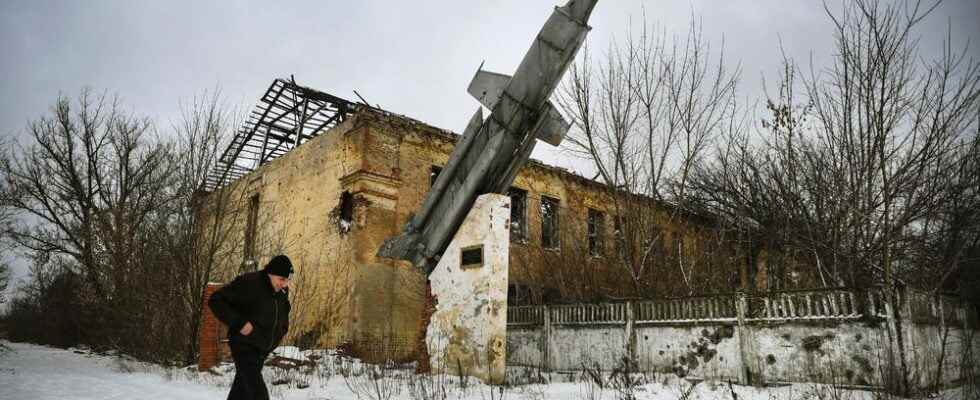Like the mighty Dnieper River that overlooks the capital, life follows its course in Kiev. Neither general panic, nor supply problem in stores or service stations: so far, so good. However, the situation at the country’s borders, where Russia has been sending troops (nearly 127,000 men) and military equipment since October, is on everyone’s mind. “It’s not at the center of our daily lives, but it’s clear that all these discussions around a possible war do not make us calm,” admits Lilia Popovkina, a retiree who sells flowers at a metro exit in a dormitory district far from the city center.
Russian troops are at the border and this one, only 90 kilometers to the north, is less than an hour away. However, joint military exercises with Belarus were announced on January 19. “But an attack seems unlikely, reassures this 68-year-old grandmother. Here, half of the people have relatives in Russia,” she adds. She herself has aunts and cousins on the other side of the border… but since the annexation of Crimea in 2014, she hardly speaks to them anymore. “It’s just hello and goodbye.”
“Of course it worries me, but panicking does not help anything,” adds Alexander, 47, from the big city of Donetsk, now included in the pro-Russian separatist region, 7 hours by train from the capital. It’s been going on for years: it’s all politics!” For eight years, Kiev has been fighting against Moscow-sponsored separatist groups in the east of the country, in a conflict that has already claimed at least 13,000 dead and 1.5 million displaced. “In the eyes of European observers, the current rise in tensions represents a break,” notes sociologist Anna Colin Lebedev, a specialist in post-Soviet societies. “But for Ukrainians, the break has already took place in 2014, with the annexation of Crimea and the war in Donbass. Since then, people have become accustomed to Russian aggression.”
A destroyed building of a former military installation, in the suburbs of Donetsk in eastern Ukraine, January 18, 2022
afp.com/Alexander NEMENOV
“Nothing is simple but there is hope”
In the capital, the tension has risen a notch in recent weeks. In December, the inhabitants brushed aside – sometimes with annoyance – the possibility of a Russian offensive which, for them, represented a fanciful scenario. Today, the question is taken very seriously by the population, which closely follows the evolution of the news and the bitter American-Russian talks. “It even seems that all the ambassadors have been evacuated,” worries Lilia, for whom this information heard on television gives the measure of the gravity of the moment. In reality, only Washington has decided to recall the families of its diplomats there, followed by the United Kingdom and Canada, which are repatriating part of the staff. The decision angered the Ukrainian authorities.
In recent hours, the government has multiplied reassuring statements, aimed at the population but also at investors, troubled by the fall in the price of the hryvnia, the Ukrainian currency. “The evacuation of embassies does not mean that the escalation [militaire] is inevitable,” said Ukrainian President Volodymyr Zelensky, before adding: “The government does not see life in pink, but we are not naive yet. Nothing is simple, but there is hope. By continuing to work around the clock on a solution, there will be results.” After a meeting of Russian, Ukrainian, French and German negotiators on January 26 in Paris, a new meeting in Normandy format is scheduled in two weeks in Berlin. , in an attempt to defuse the crisis.
In the corridors of the Kiev metro, in 2012.
AFP
Are we heading towards war or towards de-escalation? “In any case, the divorce is consummated between the Russians and the Ukrainians, continues Anna Colin Lebedev. The latest initiatives from Moscow only consolidate this trend. The Ukrainians – including those who considered themselves close to Russia before 2014, while remaining on the Ukrainian side – defend above all the idea of the territorial integrity and sovereignty of the country.” In a recent survey by the International Institute of Sociology in Kiev, 1 out of 3 Ukrainians said they were ready to take up arms to resist Russian intervention. And 1 in 5 (precisely 22%) say they want to participate in a civil resistance movement.
25-year-old computer programmer Andriy Lachko [le nom a été modifié] still thinking about his plans. Undecided, he is torn between the desire to flee in front of a possible invader and the visceral need to stay alongside his loved ones. So he plans to take a few vacations abroad, “just in case”. “I’d rather escape than die in a war for no reason, he explains. But circumstances can change. And who knows? I may be more patriotic than I think. Because if I don’t don’t hire me for my country, so who will?”
